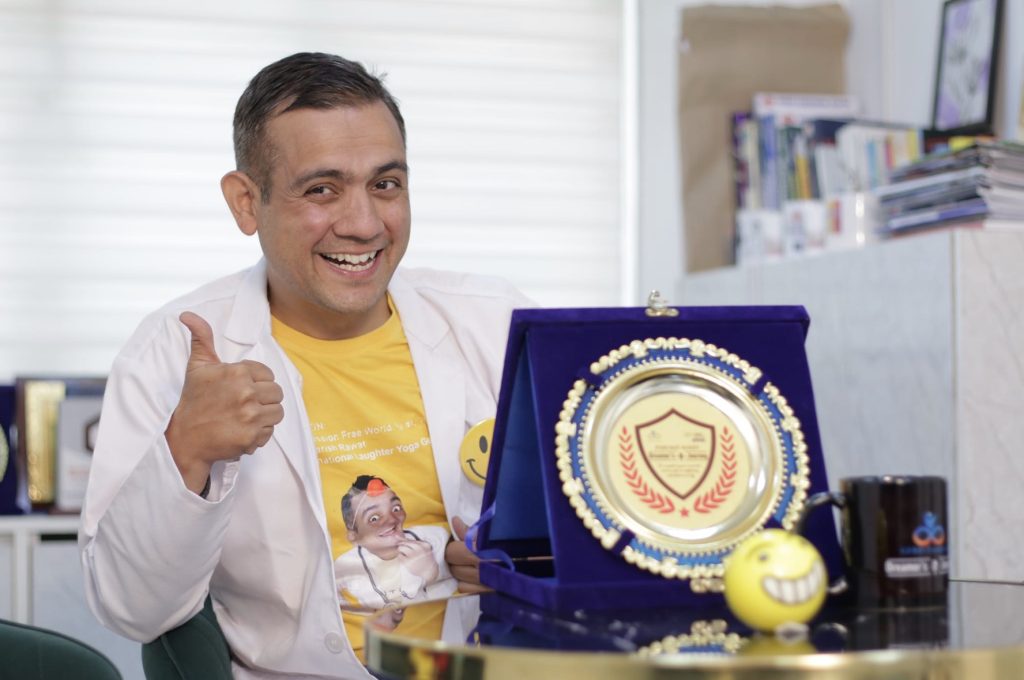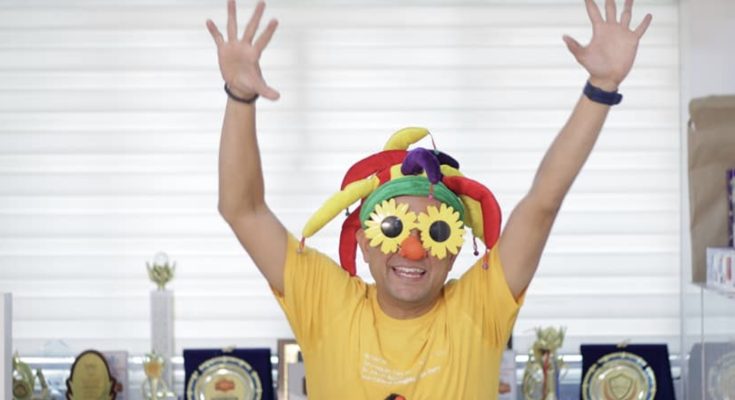This week on Visionary Voices, Mahima Sharma speaks to Rex-Karmaveer Chakra and multiple-award winning Laughter Yoga Mentor, Dr Harish Rawat.
Dr Rawat, I will start with a very tough and a straight question first, before we come to your journey. How can Laughter Therapy reshape global mental health in these times when wars are raging and media is showing gory images to bring out the brutal reality?
Dr. Rawat: See Mahima, people need to understand that in a time of war, despair and mental exhaustion, laughter is not a luxury—it is a necessity. It is a medicine without side effects, a therapy without cost and a universal language of healing.
In a world gripped by wars, media-driven anxiety and rising mental health disorders, Laughter Therapy stands as a scientifically proven, cost-effective solution to combat stress, anxiety and depression.
Studies show that just 10–15 minutes of laughter can reduce cortisol levels by 39%, increase serotonin and dopamine and boost immunity by up to 40%—all crucial for mental resilience in times of crisis.
Why Laughter Therapy is Essential Now?
Counteracts War-Induced Trauma – The World Health Organisation (WHO) reports that 1 in 5 people in conflict zones suffer from mental health conditions. Laughter Yoga and Laughter Meditation help release emotional pain, restore hope and create psychological safety.
Reduces Anxiety from Negative Media Exposure – Studies indicate that continuous exposure to violent news increases stress levels by 27%. Laughter activates the parasympathetic nervous system, reducing fight-or-flight responses and promoting inner calm.
Restores Social Connection & Empathy – Shared laughter boosts oxytocin levels by 30%, strengthening human bonds in a world divided by war and politics. Laughter Clubs and group therapy sessions foster community support, crucial for post-trauma recovery.
A Natural Antidepressant – Harvard Medical School research suggests that laughter therapy can reduce symptoms of depression by 55% in patients with PTSD and chronic stress.
For general public awareness let me share that we are already in the times when the Global Movement for Mental Well-Being has already begun in various forms be it nature therapy or laughter therapy. Countries like India, the USA and Germany are integrating Laughter Yoga into hospitals, refugee camps and corporate wellness programs.
The Lot of Laughter (LOL) Yoga Foundation, founded by Dr. Harish Rawat, is actively working towards a depression-free world through laughter-based interventions.
Now coming to your journey, what inspired you to become a Laughter Yoga Specialist? What was the moment that changed your life?
Dr. Rawat: See Mahima, I wasn’t always the laughter guy. In my college days, I was lost—trapped in a cycle of smoking, drinking and drugs, searching for an escape from my own mind. The deeper I went, the emptier I felt. Then, one day, I stumbled upon yoga and meditation. It was like light breaking through my darkness.
For the first time, I felt a natural high—pure peace and happiness. Yoga healed me, gave me purpose and I knew I had to share this feeling with the world.
But something was missing. As I worked with young people, I saw their struggles—stress, depression, even suicidal thoughts. They needed something more engaging, something that didn’t feel like a chore. That’s when I found Laughter Yoga. It wasn’t about complicated poses or deep silence—it was playful, energetic and powerful. Belly laughs, goofy props, silly exercises—it was a simple yet profound way to unlock joy.
In 2015, I launched the Lot of Laughter Yoga Foundation to help create a depression-free world. Laughter became my tool, my mission, my way of healing. And the results? Incredible. People found relief, energy and a new perspective on life—just by laughing.

Can you share a powerful story where laughter changed someone’s life?
Dr. Rawat: Over the years, I’ve seen laughter transform lives in ways I never imagined. Here are a few moments that prove its healing magic:
I have taken Laughter to Cancer Wards – During Diwali, I visited a cancer hospital to bring joy to patients. We laughed, danced and embraced the moment. That night, one of the patients passed away, but their family told me something that stayed with me forever: “Today, for the first time in months, they were truly happy.” That’s the power of laughter—it can create peace even in the toughest times.
Stress Relief for Our Protectors – I work closely with defense forces and police officers. Their jobs are relentless, their stress levels sky-high. In my Laughter Yoga sessions, I see the transformation—strong, serious individuals melting into childlike laughter, their worries lifting, if only for a while. Laughter helps them cope, connect and recharge.
I have also taken laughter for Healing the ones those are living Behind Bars – In prisons, emotions run deep—anger, guilt, regret. Laughter Yoga has opened a new path for inmates, helping them release tension, process emotions and even find moments of self-reflection. Some express remorse, some rediscover hope. It’s not just about laughter—it’s about emotional freedom.
Then we also work with Bringing Light to the Elderly because loneliness is a silent epidemic among seniors. In old-age homes, I’ve seen laughter rekindle their playfulness, reduce anxiety and bring back memories of joy. Many have told me, “I haven’t laughed like this in years.” That’s the magic—laughter reconnects us with life.
How do you tailor laughter sessions for different people?
Dr. Rawat: I use various techniques and their mix to create a holistic approach. The same shoes doesn’t fit all, so Laughter Yoga has to be customised as per group needs or individual/small batch needs. Each session is a journey—from awkward giggles to uninhibited laughter, ending in deep relaxation and inner peace.
1. Warm-Up Games – Playful movements and simple exercises help ease into laughter.
2. Laughter Techniques – Fake laughter, deep belly laughs, clapping rhythms—each designed to trigger genuine joy.
3. Props & Playfulness – Funny hats, feather ticklers—anything to break inhibitions.
4. Mirroring & Group Connection – Seeing others laugh makes laughter contagious!
5. Stress-Specific Sessions – Whether it’s corporate stress, depression, or anxiety, I adapt exercises for different needs.
6. Breathing & Meditation – Laughter is powerful, but when combined with breathwork, it becomes deeply healing.
7. Positive Affirmations – Every session ends with affirmations to boost self-love and confidence.
People say we have already joined local laughter clubs or general Yoga as therapy for mental health. So why should they choose Guided Laughter Yoga by Dr Harish Rawat over traditional yoga or meditation?
Dr. Rawat: Of course, it’s not about replacing yoga or meditation—it’s about adding laughter as a powerful wellness tool. Yoga and meditation are proven stress-busters, but they require patience and practice. Laughter Yoga, on the other hand, delivers instant results. Here’s why:
- Easy & Accessible – No need for flexibility or years of training. Just laugh!
- Instant Mood Booster – Endorphins kick in within minutes, melting stress away.
- Social & Engaging – Unlike meditation, laughter is interactive and community-driven.
- Breaks Mental Barriers – It helps release emotional blocks faster than silent introspection.
How can Laughter Yoga be integrated into mainstream healthcare?
Dr. Rawat: Laughter Yoga isn’t just a wellness trend—it belongs in mainstream healthcare. In my experience and expertise, I have found that it’s already making waves:
1. Hospitals & Recovery Centers
- Post-surgery, laughter reduces pain and speeds up healing.
- Cancer wards use laughter therapy to improve mental resilience in patients.
- Mental health programs integrate Laughter Yoga for anxiety and depression management.
2. Corporate Wellness & Stress Management
- Laughter sessions improve employee morale, reduce burnout and boost productivity.
- Team-building exercises using laughter create stronger, happier work environments.
- The research backs it up—my own study on Distance Online Laughter Yoga (DOLY) shows its impact on stress, anxiety and workplace mental health. The future of healthcare is holistic and laughter is a crucial part of it.
Please share with us more about your Guinness World Record, we heard you created a very big one!
Dr. Rawat: Oh yes, thank you! In 2018, I took my mission to the world stage—setting a Guinness World Record for the longest Laughter Yoga marathon.
With no big sponsors—just self-funding, support from loved ones and pure passion—we laughed for 36 hours and 2 minutes, breaking the previous 24-hour record.
But this wasn’t just about a record. We used the event to promote mental health awareness, respect for elders and positive social change. This milestone proved that laughter isn’t just fun—it’s a force for transformation.
AI is the buzz word these days. How is AI impacting Laughter Yoga?
Dr. Rawat: I don’t see it as a challenge, let me clear that first. AI and technology are reshaping Laughter Yoga in both positive and negative ways:
Global Access – Virtual sessions bring Laughter Yoga to those who can’t attend in person.
Personalised Laughter Plans – AI-powered apps can create tailored laughter routines.
New Research Opportunities – AI helps measure the scientific effects of laughter on health.
The flips-sides are:
Loss of Human Connection – Virtual laughter lacks the energy of in-person sessions.
Ethical Risks – AI must respect cultural differences in humour.
Digital Divide – Not everyone has access to AI-driven wellness tools.
Future possibilities are also there, Mahima. AI laughter coaches, biofeedback for real-time stress relief and global laughter networks.
Talking of the Future of Laughter Therapy in Mental Health, can you share deeper thoughts on the same?
Mental health challenges are skyrocketing and laughter therapy has the power to make a global impact:
Destigmatising Mental Health – Laughter makes conversations about mental well-being lighthearted and approachable.
Building Emotional Resilience – It teaches people to cope with stress in a fun, natural way.
Bridging Cultures & Communities – A smile is universal—laughter can unite the world.
But for wider and true impact, we need the following key support systems…
More scientific research to validate its benefits.
Integration into mental health programs and govt policies.
Community-driven laughter initiatives in schools, workplaces and homes.
Laughter isn’t just a reaction—it’s a therapy, a movement and a way to heal the world. So take a deep breath, let go of your worries and laugh your way to happiness!
The Think Pot is grateful to Dr Harish Rawat for such a heart-warming insight! for corporate and batch bookings, you can connect with him here

